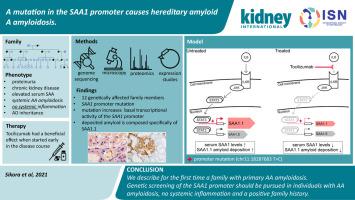Kidney International ( IF 14.8 ) Pub Date : 2021-09-21 , DOI: 10.1016/j.kint.2021.09.007 Jakub Sikora 1 , Tereza Kmochová 2 , Dita Mušálková 2 , Michal Pohludka 2 , Petr Přikryl 3 , Hana Hartmannová 2 , Kateřina Hodaňová 2 , Helena Trešlová 2 , Lenka Nosková 2 , Lenka Mrázová 2 , Viktor Stránecký 2 , Mariia Lunová 4 , Milan Jirsa 5 , Eva Honsová 6 , Surendra Dasari 7 , Ellen D McPhail 8 , Nelson Leung 9 , Martina Živná 2 , Anthony J Bleyer 10 , Ivan Rychlík 11 , Romana Ryšavá 12 , Stanislav Kmoch 10

|
Amyloid A amyloidosis is a serious clinical condition resulting from the systemic deposition of amyloid A originating from serum amyloid A proteins with the kidneys being the most commonly and earliest affected organ. Previously described amyloid A amyloidosis is linked to increased production and deposition of serum amyloid A proteins secondary to inflammatory conditions arising from infectious, metabolic, or genetic causes. Here we describe a family with primary amyloid A amyloidosis due to a chr11:18287683 T>C (human genome version19) mutation in the SAA1 promoter linked to the amyloidogenic SAA1.1 haplotype. This condition leads to a doubling of the basal SAA1 promoter activity and sustained elevation of serum amyloid A levels that segregated in an autosomal dominant pattern in 12 genetically affected and in none of six genetically unaffected relatives, yielding a statistically significant logarithm of odds (LOD) score over 5. Affected individuals developed proteinuria, chronic kidney disease and systemic deposition of amyloid composed specifically of the SAA1.1 isoform. Tocilizumab (a monoclonal antibody against the interleukin-6 receptor) had a beneficial effect when prescribed early in the disease course. Idiopathic forms represent a significant and increasing proportion (15-20%) of all diagnosed cases of amyloid A amyloidosis. Thus, genetic screening of the SAA1 promoter should be pursued in individuals with amyloid A amyloidosis and no systemic inflammation, especially if there is a positive family history.
中文翻译:

SAA1 启动子的突变导致遗传性淀粉样蛋白 A 淀粉样变性
淀粉样蛋白 A 淀粉样变性是一种严重的临床病症,由源自血清淀粉样蛋白 A 的淀粉样蛋白 A 的全身沉积引起,肾脏是最常见和最早受影响的器官。先前描述的淀粉样蛋白 A 淀粉样变性与血清淀粉样蛋白 A 蛋白的产生和沉积增加有关,这些蛋白继发于感染、代谢或遗传原因引起的炎症状况。在这里,我们描述了一个患有原发性淀粉样蛋白 A 淀粉样变性的家族,原因是与淀粉样蛋白SAA1.1单倍型相关的SAA1启动子中的 chr11:18287683 T>C(人类基因组版本 19)突变。这种情况导致基础SAA1加倍启动子活性和血清淀粉样蛋白 A 水平持续升高,在 12 名受遗传影响的亲属中以常染色体显性模式分离,而在 6 名未受遗传影响的亲属中均未发现,产生超过 5 的具有统计学意义的对数 (LOD) 得分。受影响的个体出现蛋白尿、慢性肾脏疾病和淀粉样蛋白的全身沉积,具体由 SAA1.1 异构体组成。托珠单抗(一种针对白细胞介素 6 受体的单克隆抗体)在病程早期处方时具有有益效果。在所有诊断的淀粉样蛋白 A 淀粉样变性病例中,特发性形式占显着且不断增加的比例 (15-20%)。因此,SAA1的基因筛查应在患有 A 淀粉样蛋白 A 淀粉样变性且无全身炎症的个体中寻求促进剂,特别是如果有阳性家族史。









































 京公网安备 11010802027423号
京公网安备 11010802027423号